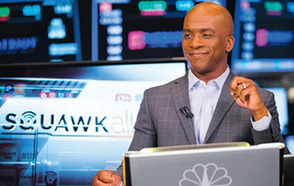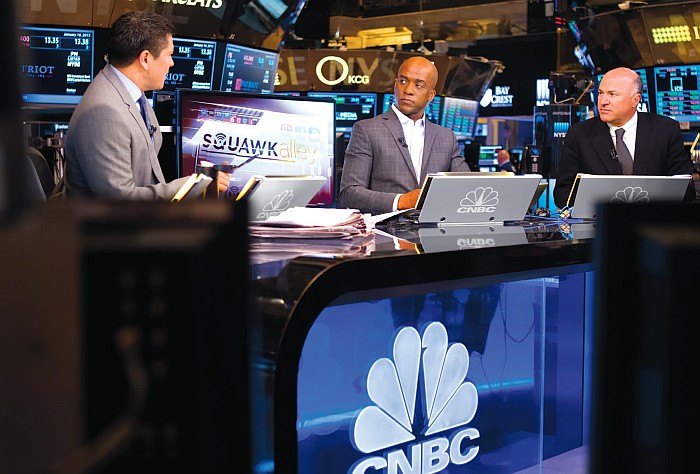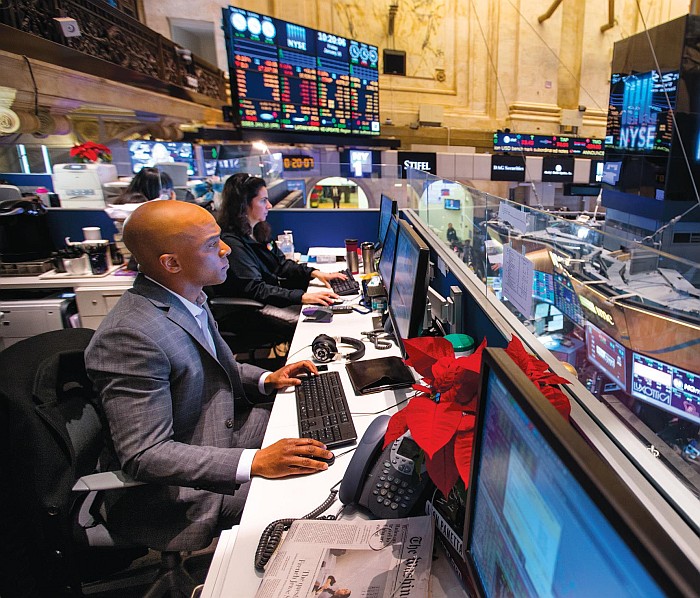News & Media
A Good Fit

John Fortt on the set of Squawk
May 26, 2015
Jon Fortt '98 made a smooth transition from print to broadcasting
Currency traders have been in a tizzy for 24 hours since the Swiss National Bank detached the Swiss franc from the euro. British Prime Minister David Cameron is threatening to ban encrypted-messaging apps, to fight terror. And, here at home, America’s tech moguls are likely plotting counter-moves to the mobile phone newly launched by Chinese electronics upstart Xiaomi.
So go the stories roiling investors on this third frigid Friday in January, yet you’d never know it from the tranquil scene at the New York Stock Exchange. Here, blue-jacketed traders schmooze beneath a sea of blinking screens, browse newspapers, savor coffees. And, yes, lean against the trading desks.
Chances are, then, they miss the small, fit, handsome man with the shaven pate who quietly makes his way across the crowded floor to the brightly lit, circular-shaped set for cable business-news giant CNBC. Once in place, however, Jon Fortt ’98 shatters the tranquility: When the cameras roll at 11 a.m. and his (and cohosts Carl Quintanilla and Kayla Tausche’s) live show Squawk Alley begins, Fortt lets loose a wave of energy so charged you’d think he’d chugged half those traders’ coffees en route to his seat:
Squawk Alley, which covers technology news, airs five days a week, and cohost Fortt – voice elevated, hands in perpetual motion – is geared up to question, poke and prod his high-profile guests on a wide range of issues :
To technology commentator Kara Swisher on the demise of Google Glass: “Do you think once they shut down the explorer program on the 19th, which I believe is Monday, it’ll be just a couple of weeks [until] we’ll see some fantastic new version? Or does it take a long hibernation?”
To software-design CEO Simon Segars on the appeal of “smart homes:” “Are people really going to need ‘smart’ washing machines? Do we have the answer to that yet?”
To Shark Tank super-investor Kevin O’Leary on Xiaomi’s move into browser, messaging and other services: “They’re up against the likes of a Facebook if they do move in there – also Tencent and Alibaba. Can they coexist in an ecosystem, I think, is the question for the future.”
Fortt, an on-air editor for CNBC for a little more than a year and bureau reporter in the network’s Silicon Valley bureau for three years before that, seems in his element probing everything business, from Intel’s newest earnings report to the future of encrypted-messaging apps. But while technology and innovation are his specialty, those cool new gadgets popping up in everyone’s hands aren’t his focal point, Fortt tells a visitor after the show.
“His [Fortt’s] work has kept CNBC in the forefront of technology coverage, which is vital for any business news organization.”
– James B. Stewart ’73, Pulitzer Prize winner and New York Times columnist
“I think historically we tend to focus too much on gadgets,” Fortt says during an interview in an Exchange dining room so antiquated that Alexander Hamilton must have lunched here. Gadgetry actually isn’t the best way to predict technology’s future, Fortt argues, explaining, “Everybody wants a flying car, and nobody sees email coming.
“So there’s too much of a focus on gadgets and not enough on software,” he says. “Right now, we need a new kind of software that can manage these gadgets and [tell us] how we’re sleeping, how many steps we took, how many flights of stairs we climbed. [For] all of these things – there’s no real dashboard to manage that information.”
Software dashboards? Talk to Fortt of such things, and the conversation turns naturally to the Zen master of both – Apple, which famously integrated hardware and software in its Macintosh computer (and subsequent products) and built the dashboards iTunes and the App Store. Yet Apple has another kind of resonance for Fortt: “In early 2000,” he says of his print-journalism days at the San Jose Mercury News – Silicon Valley’s hometown paper – “they gave me a beat covering a couple of companies that weren’t so central because I was new, companies they weren’t so sure were going to make it …” He pauses for effect: “Adobe and Apple” – his listener chortles.
“That’s why I’m still employed today, basically,” Fortt says. “Because I started covering Apple in 2000 when not as many people were.”

His early days
The story of Fortt’s rise in sync with Apple’s is compelling, complete with close encounters with the late, legendary Steve Jobs. But Fortt first takes a detour to recount how he even got to that point at such a young age – considering that he’s still only 38.
That journey began in Long Island, Brooklyn and Washington, D.C., where Jonathan V. Fortt grew up the second son and third child of John Fortt, an architect-turned-United Church of Christ minister, and his wife, Annette, a Pratt Institute-trained artist and teacher. “They don’t pay ministers that well,” Fortt observes, pegging his family’s mid-range economic niche. “But my parents were both graduate-school educated, so education was always very important.”
Family was important, too. “I was really fortunate,” Fortt says. “I was the youngest in the family,” alongside older siblings Tavia and Steven, “and we had a lot of fun with my brother, who’s seven years older but still liked playing with me. We spent a decent amount of time at church every Sunday, seeing my dad in the pulpit and hearing his messages. And school and creative endeavors were always important” – he mentions drawing superheroes and starting piano at age 5, paving the way for his lifelong love affair with music, both writing and performing it.
“I remember the moves,” Fortt also says of his parents’ frequent need to uproot the kids. “I remember going through the brownstone in Bed-Stuy [Bedford-Stuyvesant in Brooklyn] and going up to the second floor bedroom and looking down at the backyard. I remember moving to D.C.”
High school was pivotal, he says, for his discovery of journalism there. “I thought I wanted to be an architect,” Fortt says, but during the elective class, he decided computer-assisted drawing was “cheating – anybody can draw a straight line with a computer.” So he turned to yearbook: “All the cheerleaders were in yearbook.” But that class was full. His third, fateful choice? Journalism. “I thought, ‘I like to write. Well, I’ll take journalism.’ I kind of fell in love with it from there.”
Of course journalism needs drama, and high school offered that, too, with early lessons in racial politics. Montgomery Blair High School, in Silver Spring, Md., which Fortt commuted to from D.C. because his mother taught nearby, needed to renovate. The problem was the school’s student body was too big for the existing site. So the Montgomery County Council voted to relocate a segment of students. Yet that would have marred the school’s cohesiveness as a place which had, as Fortt puts it, “white kids who grew up with black kids, who grew up with Asian kids, who grew up with Latino kids.”
So the students fought the relocation. And Fortt, as student government president 1993-94, led the charge: “I and a bunch of groups in and outside the school battled” to keep the student population intact. And they won. The Council backed down. The school, not the students, relocated.
That give-’em-hell mentality Fortt demonstrated so early came in handy again at DePauw, a university his mother favored as the alma mater of civil rights leader Vernon E. Jordan ’57: “I said, ‘Who?’” Fortt remembers, laughing at his teenage cluelessness. “I was a high school kid in the ’90s; I didn’t know who Vernon Jordan was.”
Instead of civil rights’ legacy, it was DePauw’s Media Fellows Program that drew Fortt to distant Indiana – along with some soul-searching about his need to experience an environment different from the urban ones that had always been home. “I hadn’t spent much time in the Midwest or outside cities, and I thought, ‘Well, if I’m really going to do this diversity stuff – meaning his personal development – I need to go outside my comfort zone.’”
Small-town Greencastle fit the bill, and DePauw’s Greek system even more so, Fortt says. But, “It was tough socially there, especially the first year-and-a-half at DePauw, because I decided not to rush – DePauw’s social system tended to be dominated by fraternities and sororities, maybe a little less now.”
Rejecting fraternity life was a decision “outside the mainstream, and certainly for freshman year, post-rush, it meant a degree of isolation. There’s a social component of that; there’s a racial component, because the Greek system is even whiter than DePauw as a whole.”
Developing journalist
Loneliness aside, Fortt says, DePauw nevertheless proved a great choice because it taught him to “work and exist in an environment that wasn’t that diverse.” Some black students joined the Association of African American Students; some pledged black fraternities and sororities. For Fortt, however, his college buddies turned out to be somewhere else entirely: The DePauw student newspaper. There he teamed with Aaron J. Lucchetti ’96 and David A. Tieche ’98 on sophisticated journalistic investigations.
Such serious journalism was all-consuming, certainly, but there were college-boy pranks as well, Tieche remembers, like sneaking into Gator’s bar in Indianapolis with fake hand stamps Fortt helpfully drew on everyone’s hand with a felt-tip pen.
“He was rather famous for his songwriting,” Tieche also recalls, detailing how Fortt would strum away in the stairwell at Humbert Hall and pick up pocket change playing in coffee houses. There was an appealing personal energy to Fortt, Tieche says: “He could get along with everybody. There were very few people he couldn’t figure out, ‘What do I have in common with this person?’”
Fortt himself credits the academics at DePauw and mentors such as English professors Cynthia E. Cornell and Andrea E. Sununu, and religious studies professor Leslie R. James – Sununu in particular.
Says Fortt: “There are some students who’ll go into DePauw feeling like, ‘I’m a pretty good writer compared to my peers; I ought to get As. I’ve gotten As in the past.’ And you come into Sununu’s class, and you don’t get an A. It crushes you.” To this day, he believes the A Sununu finally did give him was merely to bolster his confidence.
Not true, the professor herself counters by email, citing the “invaluable contributions to class discussion” Fortt made in her British Writers and English Renaissance courses. She mentions how she reconnected with Fortt last June when he returned to campus to receive DePauw’s Young Alumni Award. “He made dramatic progress as a writer,” the popular and famously tough professor writes, calling an A from her “a feat that students rarely achieve.”
“Steve Jobs liked to say that Apple existed at the intersection of technology and the liberal arts.”
Writing skills came in handy for how Fortt spent his summers during college. Thanks to the Knight Ridder Minority Scholarship program, he avoided the usual burger-flipping jobs and instead started at (now defunct) Knight Ridder Financial News in Washington right out of high school: “I was 17 years old, way in over my head,” Fortt recalls, “running around the Capitol building trying to see if [Labor Secretary] Robert Reich was saying anything about interest rates.”
Other internships followed at three newspapers, leading to a post-college job at Kentucky's Lexington Herald-Leader. But “I was kind of flailing” that first year, Fortt says. “I thought I might bail out of journalism,” because local news felt like a poor fit. But then, a stroke of luck: The paper’s technology reporter quit in a fit of spite at the managing editor, and Fortt, who was literally standing right there, got the beat.
This time the fit was perfect. In college he had explored online’s early efforts as one of the staff members who built the first website for The DePauw. Now he was covering technology, along with telecom and coal – a staple of the Bluegrass State’s economy.
By 1999 Fortt was reporting on technology in a larger venue, the San Jose Mercury News, in Silicon Valley’s backyard. That’s when he started with Apple and Adobe, those companies the paper wasn’t sure were going to make it. But of course, they did.

Transition to broadcasting
A short stint at Business 2.0 followed in 2006, before Fortt was funneled over to a sister Time Inc. publication, Fortune. “Again, [my coverage of] Apple was a big help in that,” Fortt says. CNBC had frequently dipped into the tech-reporter pool at his previous publications for guests to talk about Apple, giving Fortt a chance to get his feet wet in broadcasting.
When the opportunity came to make the jump to the cable network and broadcast field, print journalism’s dismal outlook made the decision for him: “With layoffs and buyouts happening multiple times, I was like, ‘I’ll talk to anybody.’”
Fortt subsequently put in three-plus years at the network’s San Jose bureau, followed by his big promotion to on-air editor back on the East Coast, in Englewood Cliffs, N.J. His daily “Squawk Alley” duties have him hosting at the Exchange; he writes for CNBC’s website as well. Along the way, he’s nailed interviews with some of the biggest names in tech, including Amazon CEO Jeff Bezos and Brian Krzanich, Intel’s CEO, plus – an enviable feat – the first interview with new Microsoft CEO Satya Nadella right after Nadella’s infamous statement last October that women shouldn’t ask for a raise, just trust that “the system” will deliver one.
“I consider myself to still be learning. There are always new challenges in broadcast.”
Fortt’s “seamless” transition from print to broadcast is something else to admire, says Lucchetti, now deputy banking editor at The Wall Street Journal and a confirmed print guy. “He’s really a great writer and a natural interviewer,” Lucchetti says of Fortt. “So I think that’s part of the reason he’s made the transition so well. If you watch him with a consumer, or a user of technology, or even a man on the street, or the head of a major technology company, he’s equally at ease and asks all the tough questions.”
And, from Pulitzer Prize winner and New York Times columnist James B. Stewart ’73, who appears weekly on the NBC show prior to Fortt’s: “His work has kept CNBC in the forefront of technology coverage, which is vital for any business news organization,” Stewart writes by email. “One of the biggest stories of recent years has been the rise of Apple, and Jon has run with that and done a terrific job.”
Fortt, meanwhile, tempers Stewart’s remark, recalling a not-so-terrific run-in with none other than Jobs himself.
Fortt remembers the email, which arrived on a Saturday morning, from an address something like SJobs@Pixar.com. That was a jaw-dropper in itself, but even more so was the subject line: “You made a big mistake.”
In fact he had. In reporting on the upcoming opening of the first Apple Store at Tyson’s Corner, Va., in 2001, Fortt phoned the mall asking how much per-square-foot Apple was paying. “I didn’t know, being a cub reporter in technology, that, while in residential real estate the price per-square-foot is ‘per month,’ in commercial, it’s ‘per year,’” Fortt says. “So when I calculated what Apple was going to have to pay, I was off by a factor of 12.”
Jobs’ email, normally a career high for a reporter, had the opposite effect. “I literally wanted to crawl under the couch and die,” Fortt says. “You want Steve Jobs to notice you, but not because you made a mistake.”
To his credit, Jobs, having received a printed correction, neither made a big deal out of Fortt’s goof nor named him during his remarks at the store opening – with Fortt in the audience. The Apple founder merely referred to “one of our reporters … off by a factor of 12” and characterized his company as itself humbled by its own new foray into retail.
But Fortt squirmed, nonetheless, especially when Walt Mossberg, the famous Wall Street Journal tech columnist, loudly whispered something to the effect of “What idiot did that?”
Jobs was less gracious when Fortt next met him, in 2002, when Apple opened its Apple Store in New York’s Soho, topped off by Jobs’ pride and joy: an all-glass/titanium staircase he’d personally patented.
“He came up to me in the store,” Fortt remembers, “and asked what I thought of it. And I’m trying to have something to say but not be fawning. So I said, ‘Well, I noticed that you kept a lot of the same elements from the other store design – the Genius Bar is up there – so [the layout] is mostly leaving room for more foot traffic.’”
That didn’t go over well. “He kind of looked at me out of the corner of his eye and said, ‘What do you expect, motor traffic?’ And he walks away” – leaving Fortt no chance to complete his thought that other elements could have been added to the store experience – which in fact were added later.
“He was looking for affirmation in that moment,” Fortt says today, explaining his observation that Jobs overreacted because he didn’t get what he always needed at product launches: affirmation. Never mind this tech genius’ fame, fortune and facade of supreme confidence.

Apple's contribution
Other, more positive encounters with Jobs followed, and today, four years after Jobs’ passing, Fortt is unreservedly positive in his assessment of the tech giant’s founder.
“I think their greatest contribution was their outlook on technology itself,” he says. “Steve Jobs liked to say that Apple existed at the intersection of technology and the liberal arts. And what that meant was that Apple pursued certain kinds of ideas that obviously weren’t going to make a ton of money but really felt right from a third-dimensional-experience kind of view. So Apple came out with GarageBand, this software for writing music and recording instruments. And GarageBand isn’t Microsoft Word; you’re not going to make millions of dollars off GarageBand.
“So I think what Apple did was it placed a lot of bets from the heart based on an idea of what the whole human experience should be and how computing and technology should be not just [part] of our work lives, but also our artistic selves, and express all of our passions.
“Apple put forth this idea that technology should be beautiful and that design should not just be something that you paint onto the product.”
In the Colonial dining room at the Exchange, it’s getting toward mid-afternoon, and Fortt is due back at CNBC headquarters. Responding to a visitor’s comment that he makes all those interviews on complex financial topics look easy, he waves away the praise. “I consider myself to still be learning,” he says. “There are always new challenges in broadcast.” In contrast to the reporting he did in Silicon Valley, here “There’s more anchoring, where I’m introducing a guest, then interviewing that guest on the fly based on research I’ve done that morning or the previous afternoon.
“So the rhythm is a little different; it’s a little more free-flying, more jazz than classical.”
Speaking of music, that’s what Fortt does for fun – pulling out his guitar when he can. But as a married man – his wife is reading specialist Gina Fortt, and the couple has sons Nathan, 6, and Benjamin, 4 – fatherhood is all-consuming.
“This is going to sound corny,” Fortt says when asked to name his personal bucket list. “I’m already so blessed that I’ve gotten to do things I didn’t appreciate the significance of at the time. I just want to be a good dad, a good husband, a good employee and see where it goes.
“But I don’t know,” the journalist says, pausing, once again becoming all business. “I’d love to interview [Facebook CEO] Mark Zuckerberg again this year.”
(Written by Joan Oleck for DePauw Magazine, Spring 2015. Images provided by CNBC; photos by Bob Handelman.)
Contact Us
Communications & Marketing

Bob Weaver
Senior Director of Communications
- bobweaver@depauw.edu
- (765) 658-4286
-
201 E. Seminary St.
Greencastle, IN 46135